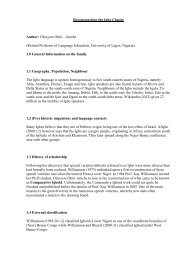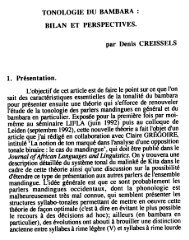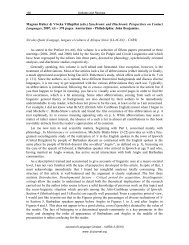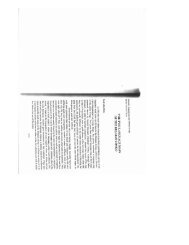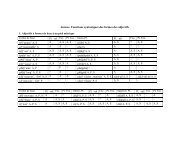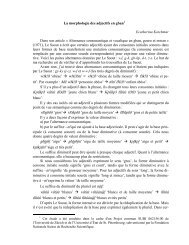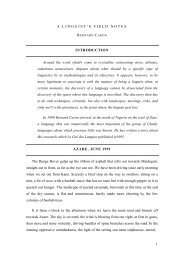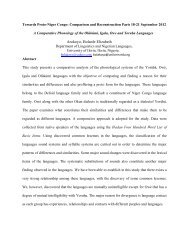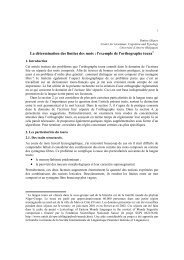Kru revisited, Kru revealed Lynell Marchese Zogbo ... - Llacan
Kru revisited, Kru revealed Lynell Marchese Zogbo ... - Llacan
Kru revisited, Kru revealed Lynell Marchese Zogbo ... - Llacan
You also want an ePaper? Increase the reach of your titles
YUMPU automatically turns print PDFs into web optimized ePapers that Google loves.
‘come’ future, sequential, potential; ‘have’ future, conditional, ‘bring’? .perfective,<br />
‘stop’, let go’ NEG markers. True reanalysis : Aux: no perf-imperf, take obj & tense suffixes<br />
NOUN CLASSES and AGREEMENT<br />
Proto <strong>Kru</strong> words were made up of *STEM + Class suffix<br />
Vestiges seen in:<br />
Pronouns:<br />
• Pronoun systems 3 rd person<br />
• Singular + plural forms : regular and irregular<br />
• In some languages, in definite markers<br />
• Remnants of concord<br />
Primary distinction is human vs non human:<br />
3 rd singular with hierarchy human > big animals > everything else<br />
Human Non-human<br />
Kuwaa (isolate) ɔ ɛ̄<br />
Niaboua (Wè) ɔ̄ ɛ̄<br />
Wobé (Wè) ɔ̄ ɛ̄<br />
Grebo (<strong>Kru</strong> cluster, W) ɔ ɛ<br />
Djabo ɔ ɛ<br />
Kouya (East) ɔ we<br />
Tepo <strong>Kru</strong> (<strong>Kru</strong> cluster, W) ɔ ɛ, o, ɔ<br />
Neyo (E) ɔ ɛ, a, ʋ<br />
Godié (E) ɔ̄ ɛ, a, ʋ<br />
Bété (Daloa) (E) ɔ́ ɛ, a, ʋ 2<br />
Dida (Yocoboué)<br />
ɔ ɛ, a, ʋ<br />
On the basis of these pronouns, we posit for 3 rd singular human *ɔ and three non-human classes<br />
*ɛ, *a, *ʋ. In many cases there are clear semantic categories which link to class markers and or<br />
remnants in other families. Currently, however, this system is described phonologically by all<br />
(Grah, Kaye, <strong>Marchese</strong>, Sauder, Saunders, Thalmann, Werle, <strong>Zogbo</strong>): in Eastern <strong>Kru</strong>, NHum<br />
words ending in front V’s take ɛ, central Vs, a, back Vs, ʋ, but final V reflects old noun class<br />
marker.<br />
In Godié nouns ending in front vowels belong to the *ɛ big animal class (many taking –a in the<br />
plural):<br />
mlɛ “animal” Ɉɛ “antilope<br />
lʋɛ “elephant” glɛ “monky” (SP)


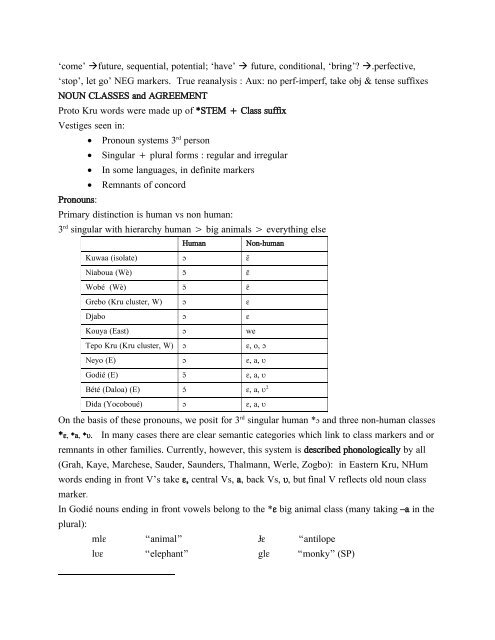
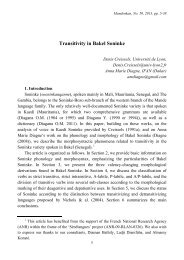
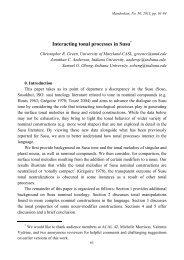
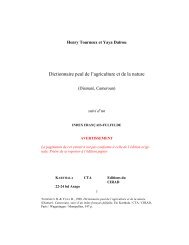
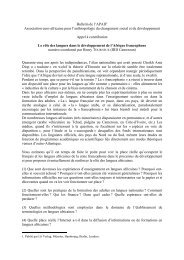
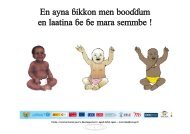
![[halshs-00645129, v1] Depressor consonants in Geji - Llacan - CNRS](https://img.yumpu.com/17832391/1/190x245/halshs-00645129-v1-depressor-consonants-in-geji-llacan-cnrs.jpg?quality=85)
